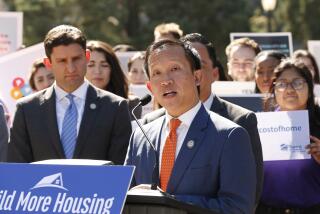Cities Join Suit Over Casinos
- Share via
Four Los Angeles County cities that are home to card clubs fear they might lose a sizable chunk of tax revenue because of the voter-approved ballot initiative that allowed Native American tribes to open Vegas-style casinos.
The working-class cities of Bell Gardens, Commerce, Gardena and Hawaiian Gardens made the claim in a “friend of the court” brief supporting a lawsuit challenging the legality of the casinos. A coalition of Bay Area card clubs filed the federal lawsuit in Sacramento in February.
“These cities have come to rely on [card club] revenues, and in reality have no ability to replace that revenue,” said Jimmy Gutierrez, a Chino-based attorney representing the four-city coalition.
Bell Gardens collected $7.5 million in business license taxes from a single card club last year--enough to cover 51% of the city’s $14.8-million budget, he said. Taxes paid by card clubs accounted for 45% of the revenue in Hawaiian Gardens, 36% in Commerce and 14% in Gardena.
Gutierrez said a recent study showed that some card clubs in Washington state lost 40% to 60% of their business when Native American casinos opened.
If card clubs in the Los Angeles area suffer similar declines, the loss of tax revenue might force the cities to cut police and fire protection, recreational facilities, roadway construction and other essential services, the court brief states.
Last year’s ballot initiative, Proposition 1A, amended the California Constitution to allow Native Americans to offer slot machines and other Nevada-style games at their casinos.
The ballot measure did not grant non-Native Americans the same rights, so card clubs are forced to skirt anti-gambling laws by renting out seats at poker tables, typically for $12 to $15 an hour. Cardholders play against one another, not against the house.
In the federal lawsuit, Northern California card clubs argue that Proposition 1A has created an illegal monopoly by allowing Native Americans to offer games no one else can. The ballot initiative also violates equal protection law by segregating state gambling laws based on ethnicity, the suit alleges.
“You can’t single out one race to have special privileges,” said Alan Titus, a Bay Area attorney who represents some of the clubs.
However, officials at the state attorney general’s office, which is defending the legality of the ballot measure, said the card clubs fail to recognize that Indian tribes are sovereign nations, entitled to operate under very different rules than non-Native American casino owners.
In their legal brief, the four cities also argue that it will be next to impossible to replace the lost card club tax revenue, since a state ballot measure approved in 1996 prohibits cities from imposing new taxes without voter assent.
With many low-income residents in the four cities, the likelihood of voters approving a tax increase is almost nonexistent, Gutierrez said.
More to Read
Sign up for Essential California
The most important California stories and recommendations in your inbox every morning.
You may occasionally receive promotional content from the Los Angeles Times.











